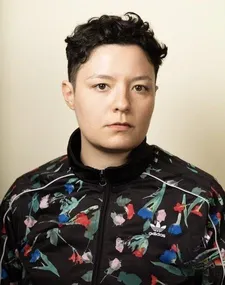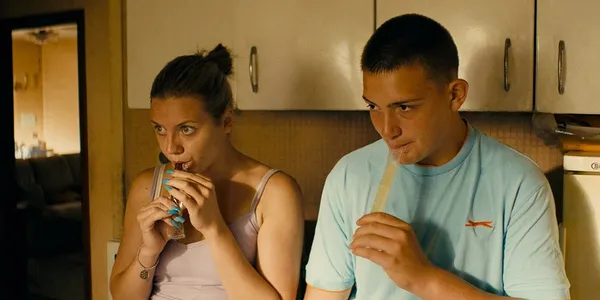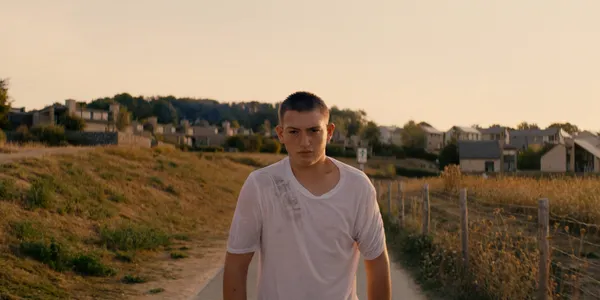Her first end-of-course short film Makenzy, about her brother’s struggle with addiction, and her award-winning documentary Petit Samedi were both shot in the area where she grew up. In the short she followed the childhood of the characters, in the second it was their adult selves and now in her first fiction It’s Raining In The House (Il Pleut Dans La Maison) she wanted to explore their adolescence.
 |
| Paloma Sermon-Daï: 'The part of the process that energises me most is the shoot itself' Photo: Aurelie Lamachère for Critics’ Week |
Her efforts have been rewarded at the Cannes Film Festival where It’s Raining In The House in the 62nd Critics’ Week selection for first or second films has been lauded with the French Touch Jury Award from a jury headed by Happening director Audrey Diwan - last year won by Aftersun.
Sermon-Daï explains that her films are distinctly family affairs. The two teenagers 17-year-old Purdey (a niece of her half brother) and Mackenzy (half brother of Purdey) are family with the same surname [Lombet) but also characters in their own right. She had thought of changing their first names but they kept spontaneously using their own names. “I gave up after a certain moment and thought OK we can keep their real names - a little bit of documentary that can remain.”
The 30-year-old felt the familiarity of her own surroundings in the village and the lake close by helped to protect her, her actors, and the tight-knit crew.
“I had to ensure that there was a separation between their daily lives and the lives of the characters. The narrative of the film allowed me to put more of myself in the story. It is a mix of my adolescence and the adolescence of the two actors.”
The lake-side setting was ideal for some of her themes about how the area is being taken over by tourism and investments by hotel groups providing jobs for the youngsters while the locals are being pushed to the side and have to seek out quieter spots around the water and away from the incomers. At the heart of the story is the arc of adolescence, finding love and fending for themselves. Their mainly absent mother seems bent on self-destruction.
She spent more than a year writing the script with Makenzy and Purdey doing workshops, some of which she filmed. “They helped to nourish the script. Although Makenzy had appeared in my short film he had no real experience of acting. We did try giving them acting lessons but stopped because I realised that I preferred them playing ‘naturally’ rather than with preconceived ideas. There was something instinctive going on between us.
“I wanted to draw a portrait of a generation and I really wanted them to talk as they would talk in real life and I wanted to respect their language. Purdey works as a cleaner in a hotel complex, and Makenzy earns money by robbing tourists. They must learn to support each other in what I hope is a tender journey that chronicles what feels like the last summer of their youth.
“We shot on a very small budget with only seven technicians. We formed a little family together. Everybody had one or more jobs to do. The atmosphere was a bit like going on holiday together.”
It wasn’t obvious that Sermon-Daï would seek out a career in cinema. She added: “My mother enjoys painting and she appreciates literature and is a great reader. Generally though I come from a fairly ordinary background. There was no cinema in the village and if I wanted to see films it involved taking the bus. I wasn’t destined to do cinema but I had the opportunity to do some theatre at school and that gave me a taste for it. Initially though I thought that this isn’t my world. But I’ve proved that you can make films on a small budget [some 400,000 euros] with unknown actors and a tiny crew.”
Her experience of the Cannes Film Festival feedback helped to boost her confidence. She said: “I was interested to find that the audiences were able to read the film well and they were able to get the subtleties of the narrative. They appeared to be touched genuinely by the relationship between the brother and sister.”
Her own experience was limited but she managed to find a place at film school “but it was more on the technical side and how to use the camera. I was pleased to have been able to do that because it really taught me how to cope with the technicalities of a shoot. The part of the process that energises me most is the shoot itself. I don’t intellectualise things too much and I rely on my instincts.”
The reaction to her progress from those in the small community has been positive. She added: “They’re very excited, of course, because it is also quite a rare event. They like to see themselves and their area on screen with people who talk like them and have the same culture. Belgium has a reputation for social cinema which at times can be heavy and depressing. I wanted to make a film of lightness where audiences can go from tears to laughter in an instant.”
As for the challenge of working on that tight budget Sermon-Daï decided that the only attitude to take was to regard it not as a constraint but as an asset. The prize from the jury would seem to indicate her instincts (yet again) were bang on target.























